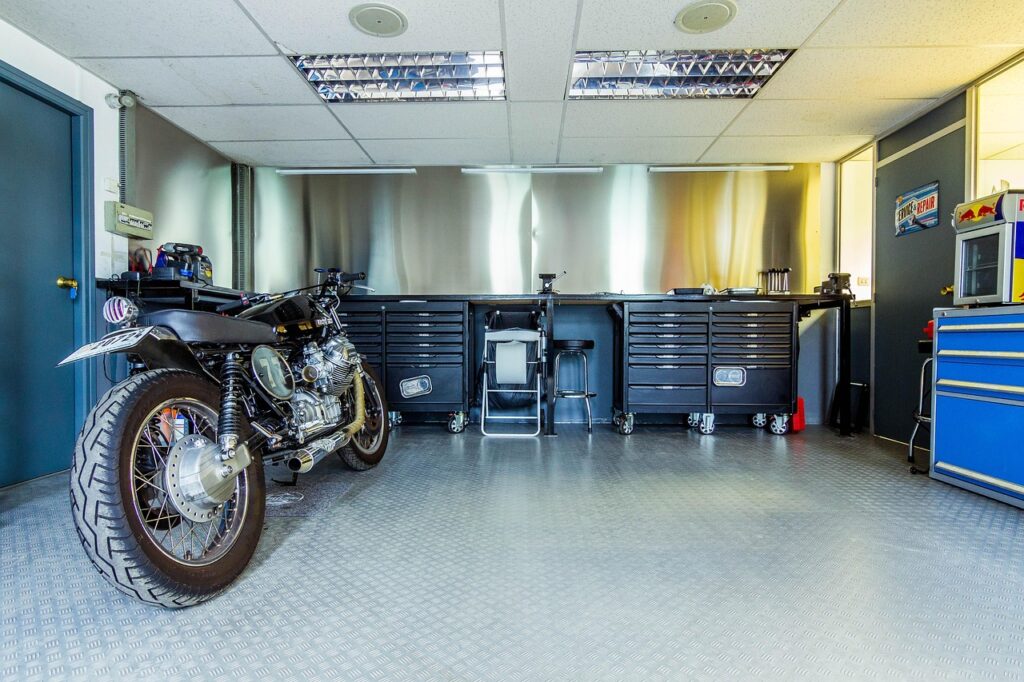When considering durable and efficient flooring solutions, polyurea floor coatings have emerged as a popular choice for both residential and commercial applications.
Known for their rapid curing times and robust protective qualities, these coatings offer a range of benefits that cater to various needs.
This article from the experts at Lion Garages delves into the nature of polyurea floor coatings, exploring their advantages, potential drawbacks, and suitability for different environments.
What Are Polyurea Floor Coatings?
Polyurea floor coatings stand out for their unique chemical composition and performance. Unlike traditional epoxy coatings that take longer to cure, polyurea sets extremely quickly—sometimes within seconds—making it an ideal solution for time-sensitive projects. This rapid curing time doesn’t compromise quality; in fact, polyurea forms an exceptionally strong bond with the substrate, creating a highly resilient and long-lasting protective layer. Because it was originally developed for use in demanding industrial environments, polyurea is engineered to handle heavy wear and tear, chemical exposure, and even extreme temperatures. These features have helped it transition from industrial and military applications to more mainstream use in residential, commercial, and institutional settings.
What makes polyurea especially attractive in flooring is its seamless, non-porous nature, which prevents moisture, dirt, and bacteria from seeping into cracks or joints. This quality is particularly beneficial in environments that demand cleanliness and sanitation, such as hospitals, laboratories, garages, and food processing facilities. Moreover, polyurea coatings are UV stable, meaning they won’t yellow or degrade under sunlight, making them suitable for both indoor and outdoor use. With customizable color and texture options, property owners can also achieve a specific aesthetic while benefiting from industrial-grade protection.
Advantages of Polyurea Floor Coatings
One of the most notable benefits of polyurea floor coatings is their rapid curing time. Unlike traditional coatings that may take days to set, polyurea can cure within seconds to minutes, allowing for quicker project completion and minimal downtime. This feature is particularly advantageous in commercial settings where time is a critical factor.
In terms of durability, polyurea coatings offer superior resistance to abrasions, impacts, and wear, making them ideal for high-traffic areas. Their dense molecular structure provides excellent resistance against a wide range of chemicals, including oils, solvents, and acids. This resistance ensures that spills do not penetrate the surface, preventing stains and preserving the floor’s appearance.
Polyurea coatings are also inherently UV stable, meaning they do not yellow or degrade when exposed to sunlight. This property makes them suitable for both indoor and outdoor applications, maintaining their color and finish over time. Additionally, the flexibility of polyurea allows it to accommodate substrate movements without cracking or peeling, which is particularly beneficial in environments subject to temperature fluctuations or structural shifts.
The seamless nature of polyurea coatings creates a hygienic surface without joints or seams, reducing areas where dirt and bacteria can accumulate. This feature is especially advantageous in settings that require high hygiene standards, such as hospitals and food processing facilities. Due to their non-porous nature, polyurea floors are easy to clean and maintain, with regular sweeping and occasional mopping typically sufficient to keep the surface looking pristine.
Potential Drawbacks of Polyurea Floor Coatings
Despite their numerous advantages, polyurea floor coatings are not without potential drawbacks. One consideration is the higher initial cost compared to traditional options like epoxy. However, the longevity and reduced maintenance needs of polyurea can offset the initial investment over time.
The rapid curing time of polyurea, while beneficial, requires precise application techniques. Improper handling can lead to imperfections, making professional installation highly recommended to achieve optimal results. Furthermore, for polyurea to adhere properly, the substrate must be thoroughly prepared, including cleaning, drying, and sometimes applying a primer, especially if the concrete has high moisture content.
Another factor to consider is the emission of strong odors during the application and curing process. Polyurea coatings consist of two components that, when mixed, release volatile organic compounds (VOCs). These VOCs are responsible for the strong odors that can be unpleasant during application. Proper ventilation is crucial to mitigate this issue, and wearing protective gear is recommended to ensure a safe working environment.
Applications of Polyurea Floor Coatings
Polyurea floor coatings are versatile and can be applied in various settings. In residential garages, homeowners often choose polyurea for its durability, chemical resistance, and aesthetic appeal. The coating withstands vehicle traffic, oil spills, and other common garage hazards while providing a sleek finish.
In commercial and industrial facilities, such as warehouses, factories, and showrooms, polyurea coatings offer a resilient flooring solution that can handle heavy machinery, foot traffic, and exposure to various chemicals. Their UV and weather resistance also make them suitable for outdoor applications like patios, pool decks, and walkways, providing a durable and attractive surface that withstands the elements.
The seamless and hygienic nature of polyurea makes it an excellent choice for environments where cleanliness is paramount, including hospitals, laboratories, and food processing plants. The coating’s resistance to moisture and chemicals ensures a safe and sanitary surface that meets stringent health standards.
Maintenance and Longevity
Maintaining polyurea-coated floors is relatively simple, making them a practical choice for both residential and commercial settings. Because the surface is smooth and seamless, dirt and grime have fewer places to hide, which reduces the amount of deep cleaning required over time. Routine maintenance typically involves sweeping or vacuuming debris, followed by mopping with a mild, nonabrasive cleaning solution. Since the coating is resistant to chemicals and water, there is little risk of damage from common household cleaners or accidental spills, and cleanup is fast and efficient.
One of the most notable benefits of polyurea flooring is its impressive longevity. These coatings are engineered to be extremely tough—often up to 20 times stronger than standard epoxy alternatives. This strength translates into high resistance against abrasion, impacts, chemical spills, and even UV exposure. Unlike other flooring systems that may chip, peel, or discolor over time, polyurea maintains its structural and aesthetic integrity for many years. It can handle the wear and tear of vehicles, heavy machinery, foot traffic, and changing environmental conditions without deteriorating.
The durability of polyurea also means fewer repair and replacement costs over the life of the floor, making it a smart long-term investment. Whether installed in a busy garage, warehouse, commercial kitchen, or retail space, polyurea-coated floors continue to perform with minimal upkeep. With proper installation and regular maintenance, these coatings can easily last 15 to 20 years or more without needing to be reapplied, offering peace of mind and cost-efficiency for property owners looking for a flooring solution that truly goes the distance.
Conclusion:
So, is polyurea floor coating right for You?
Polyurea floor coatings offer a compelling combination of durability, rapid installation, and low maintenance, making them a suitable choice for various applications. While the initial cost may be higher than some alternatives, the long-term benefits often justify the investment. By understanding the properties and considerations associated with polyurea, you can make an informed decision that aligns with your specific flooring needs.

